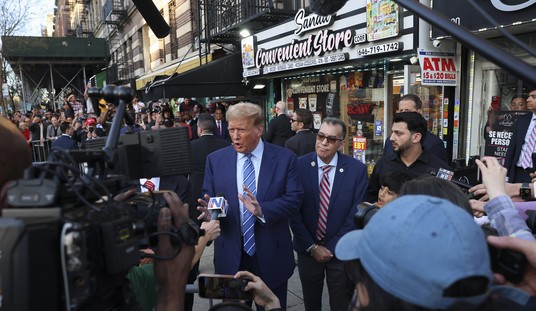In order to protect the public from the influence of people like Rupert Murdoch, the British Labour Party has proposed licensing journalists. According to the Guardian a Labour shadow minister issued this dire warning. “Your newspapers and Sky TV are popular with millions of British people … However – and yes conference we should have said this a long time ago – never again think you can assert political power or seek political influence in the pursuit of your commercial goals or ideological beliefs. We’re not having it. This is Britain, Mr Murdoch. The integrity of our media and our politics is not for sale.” The BBC reported that Labour proposed to have reporters guilty of what was termed ‘gross malpractice’ “struck off” a register.
One would think that Murdoch was the devil himself. But more on that later. For now the proposals to establish journalistic registers were met with derision even from Left wing opinion writers. For one thing journalists have always had to deal with “registers” of different kinds which determined whether or not they could work in a particular area. That register is called access. Access is fame. Access is money. Unless the working journalist has magic access he might as well go blog.
Howard Kurtz of the Washington Post says: “The White House has practically been overrun by journalists pumping top officials for behind-the-scenes details for a growing roster of behind-the-scenes books.” Greg Greenwald argues that Washington officials already control a journalist’s level of prestige and income by simply deciding whether or not to grant them interviews for what he calls “books about royal court intrigue and gossip”. Kurtz writes that based on past book sales what the audience wants is the soap-opera stuff.
For the most part, the works in progress are not dispassionate policy analyses. What makes political books sell — the backstage struggles, the fiery memos, the angry retorts in meetings — can be gleaned only from the likes of Rahm Emanuel, David Axelrod, Robert Gibbs and, perhaps, Obama and Vice President Biden.
So if you want to know what dressing President Obama uses on his salad or whether anyone on the staff wears droopy socks you have to have access. No access, no nothing.
But it isn’t just individual journalists who must fight for inclusion on the registry of access. Entire newspapers struggle to remain in good standing. The Knight Center for Journalism described how the Boston Herald got taken off the Presidential press pool because the White House didn’t like where they printed an op-ed about Romney.
Citing the newspaper’s perceived lack of fairness, the White House limited the Boston Herald’s access during a Wednesday, May 18, Boston fundraiser for President Barack Obama, according to the Boston Globe.
While the Herald still would be considered for the pool in future visits, and the pool participants were selected by the White House Correspondents Association and not the Obama administration, White House spokesman Matt Lehrich linked the Herald’s ban to its bias, citing the newspaper’s front-page placement of an op-ed written by former Massachusetts governor and potential 2012 Republican candidate Mitt Romney, explained Mediaite. …
Caren Bohan, vice president of the White House Correspondents Association, said journalists are “fighting” for more access to the president, according to the Boston Herald. “We’re constantly reminding the White House that we would like to see more press conferences and more opportunities for reporters to ask questions of the president,” she said, as quoted by the Herald. “That’s a big concern for us.”
The exclusion of the Herald follows an April incident when the White House banned a San Francisco Chronicle pool reporter who used her phone to shoot video at an Obama fundraiser in California.
Whoever described politics as Hollywood for ugly people forgot to add that like tinseltown, the Beltway also had its equivalent of the saying, “you’ll never work in this town again”. Whether anyone likes it or not, access journalism eventually leads to a kind of self-censorship, “in which the journalists voluntarily ceases to speak of issues that might embarrass their hosts.”
What is overlooked is that this potentially makes journalists a perfect channel for “disinformation”. Disinformation is the art not of denying that a set of events took place, but to color or twist the accounts in such a way as to manipulate perception. Unlike overtly totalitarian societies where the current “political line” is directly written into the media accounts of events, media manipulation in the West is attained by “disinformation” and even the Soviets knew this.
According to senior SVR officer Sergei Tretyakov, the KGB was responsible for creating the entire nuclear winter story to stop the Pershing missiles. Tretyakov says that from 1979 the KGB wanted to prevent the United States from deploying the missiles in Western Europe and that, directed by Yuri Andropov, they distributed disinformation, based on a faked “doomsday report” by the Soviet Academy of Sciences about the effect of nuclear war on climate, to peace groups, the environmental movement and the journal AMBIO.
That is the way things work to this day. There are preferred narratives which are started and reinforced by a variety of means. The audience is dimly aware that they exist — the talking points on Global Warming for example — but put cannot put their finger directly on them. They are like shadowy things — “serials” — which are suggestive but have no shape.
In order for disinformation to work well it needed two channels: an information delivery channel and a feedback loop. Once a narrative is pushed out the disinformationist must look to see how well it was accepted and then modified it based on the loop until the fish were swallowing things hook, line and sinker.
James J. Angleton, one of the pioneers in understanding disinformation techniques, realized that that Western intelligence had completely misunderstood the architecture of Soviet intelligence operations against them. They believed the KGB had designed their system to “steal secrets” — when in fact what it was designed to do was send instructions to Western policymakers in such a way they could not be recognized as instructions.
Angleton spent the better part of the next decade attempting to unravel the design of his arch
rival, the KGB. … When he interviewed the CIA executives involved, he came to the conclusion that part of the problem was an institutional arrogance: a belief they could not be duped. As he formulated the problem to
Dulles, the success of a deception over time depended on constant fine tuning to keep it credible. . … was able to succeed because its deception planners had a constant stream of feedback from Philby. So when even parts of the WIN story did not ring true to the CIA or MI-6, they could be adjusted by supplying another false defector or piece of disinformation. This real-time information from inside the CIA was what sustained the deception.
Similarly, it is wrong to think that that the primary role of the media is to investigate the powers that be; to “speak truth to power”. What they are for is to serve as a disinformation channel. The real power of the media “access system” is that it plays to the journalist’s vanity. Like the CIA, most journalists cling to the idea that they cannot be duped which in turn makes them vulnerable to serving as conduits for whatever “messaging” (ie ‘disinformation’) campaign the White House is running today.
Viewed in this light, why would the British Labour Party want to propose a “register” of journalists? What one suspects they really wanted to do, but had not the wit to find a means to accomplish, was to seal off a hostile penetration. Using phone-hacking and paying sources, Murdoch was on the brink of achieving something that very few other media organizations had achieved. He was in a position to “turn” officialdoms sources on themselves. Murdoch was about to convert Whitehall’s disinformation channel into a two way street. The worry over the phone-hacking scandal went way beyond the idea that some privacy walls had been the breached. The real issue was “who controls messaging process”.
A Labour MP has alleged that phone hacking at News International has gone “far beyond the News of the World” as he claimed that the Sun newspaper is also implicated in illegal practices. … Watson warned Labour activists that the scale of phone hacking at the now closed News of the World could be the tip of the iceberg.
“Do you really think that hacking only happened on the News of the World?” he said. “Ask Dominic Mohan, the current editor of the Sun. He used to joke about lax security at Vodafone when he attended celebrity parties. Ask the editor of the Sun if he thinks Rupert Murdoch’s contagion has spread to other newspapers. If he gives you an honest answer, he’ll tell you it’s only a matter of time before we find the Sun in the evidence file of the convicted private investigator that hacked Milly Dowler’s phone.
“This month we learn that journalists at the Times are affected by this scandal. The paper is shutting down its BlackBerry phone network – I hope they aren’t deleting the records.”
The emergency motion called for trade unions to have a role on the press watchdog and for the rules governing media ownership in Britain to be examined in the wake of the affair.
You can argue that this is the underlying reason for the incandescent hatred of Rupert Murdoch. He understood the rules of the game and unlike the individual journalists, was in a power position to challenge them.
Storming the Castle at Amazon Kindle for $3.99
Tip Jar or Subscribe for $5









Join the conversation as a VIP Member